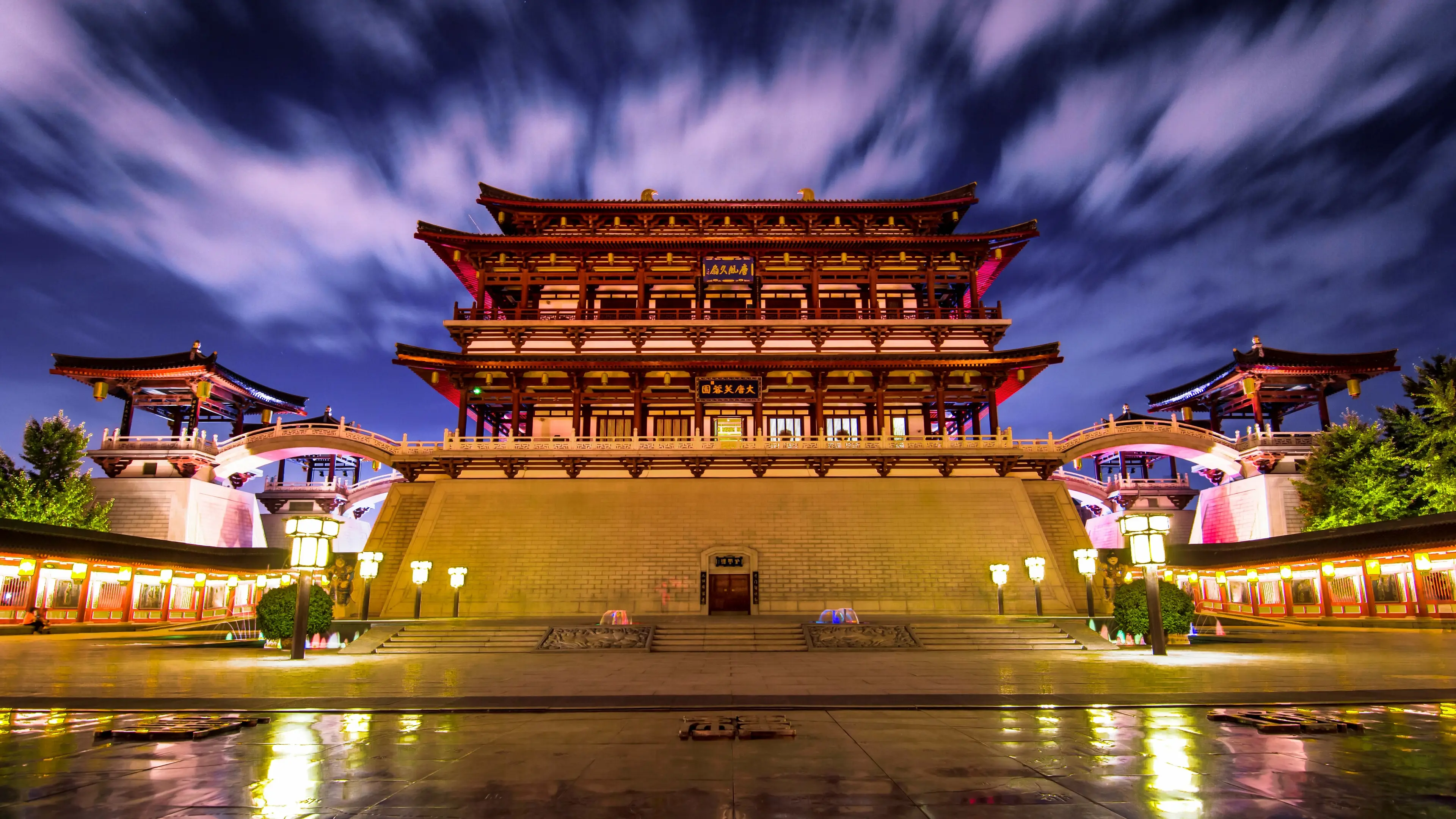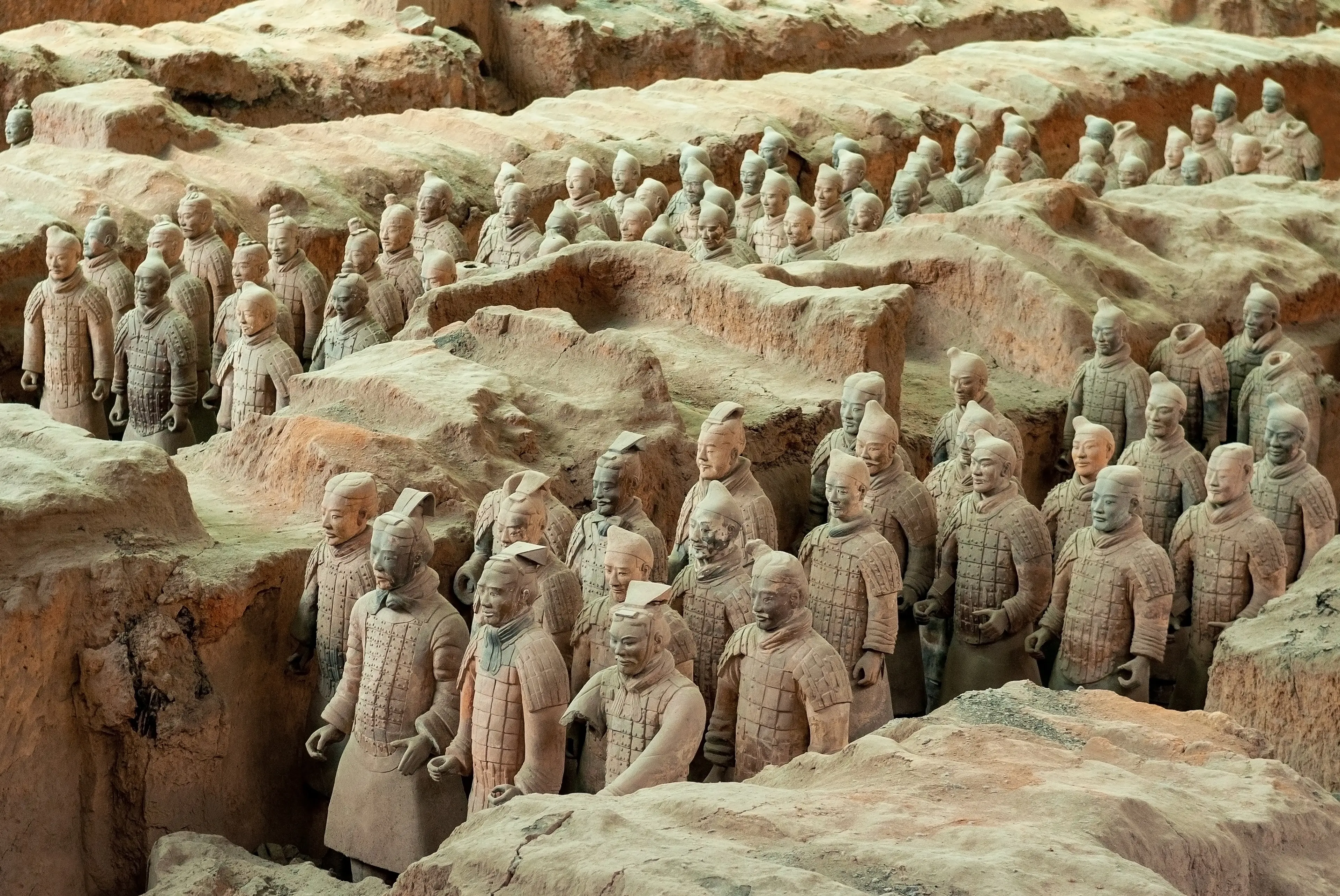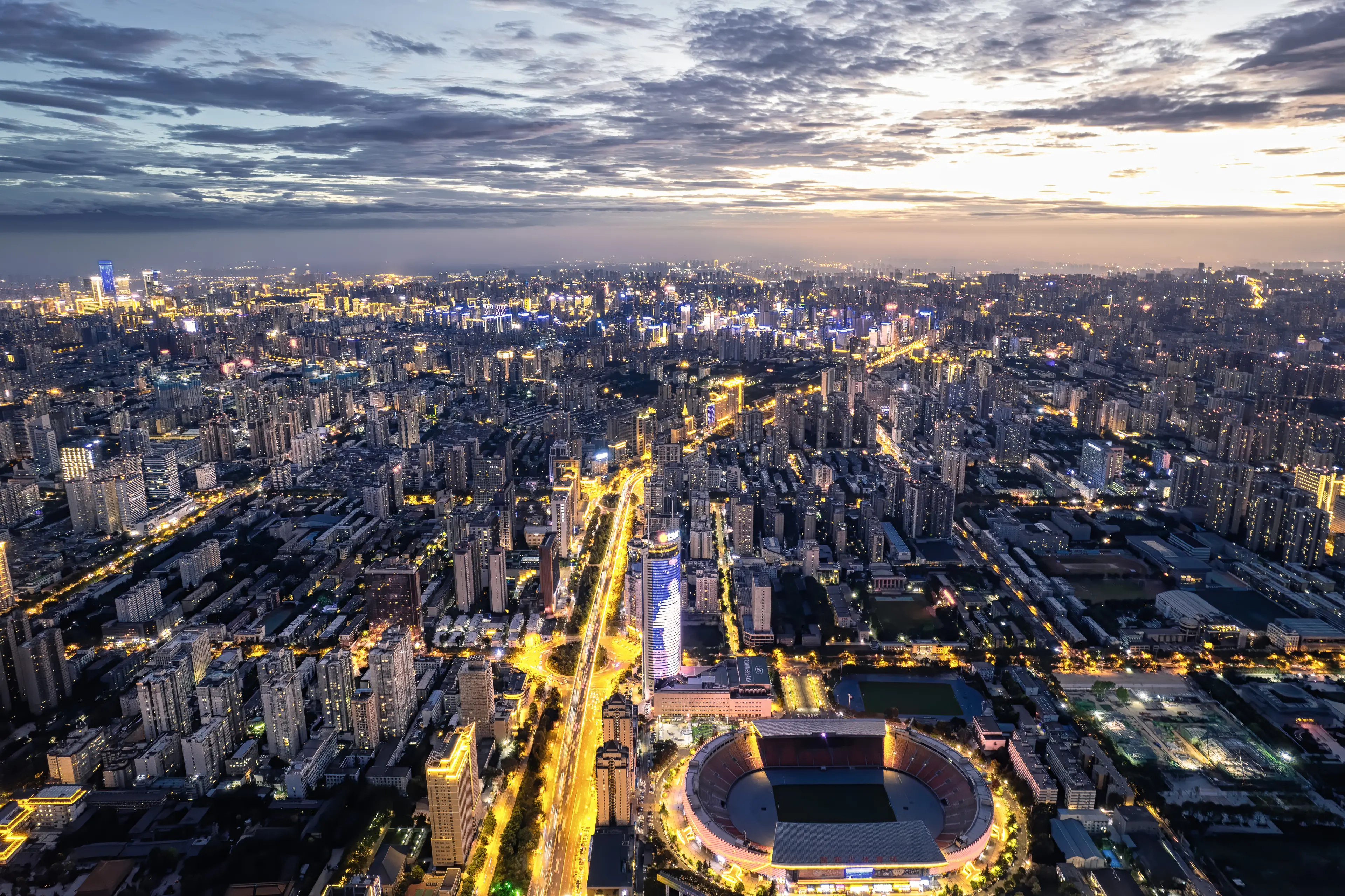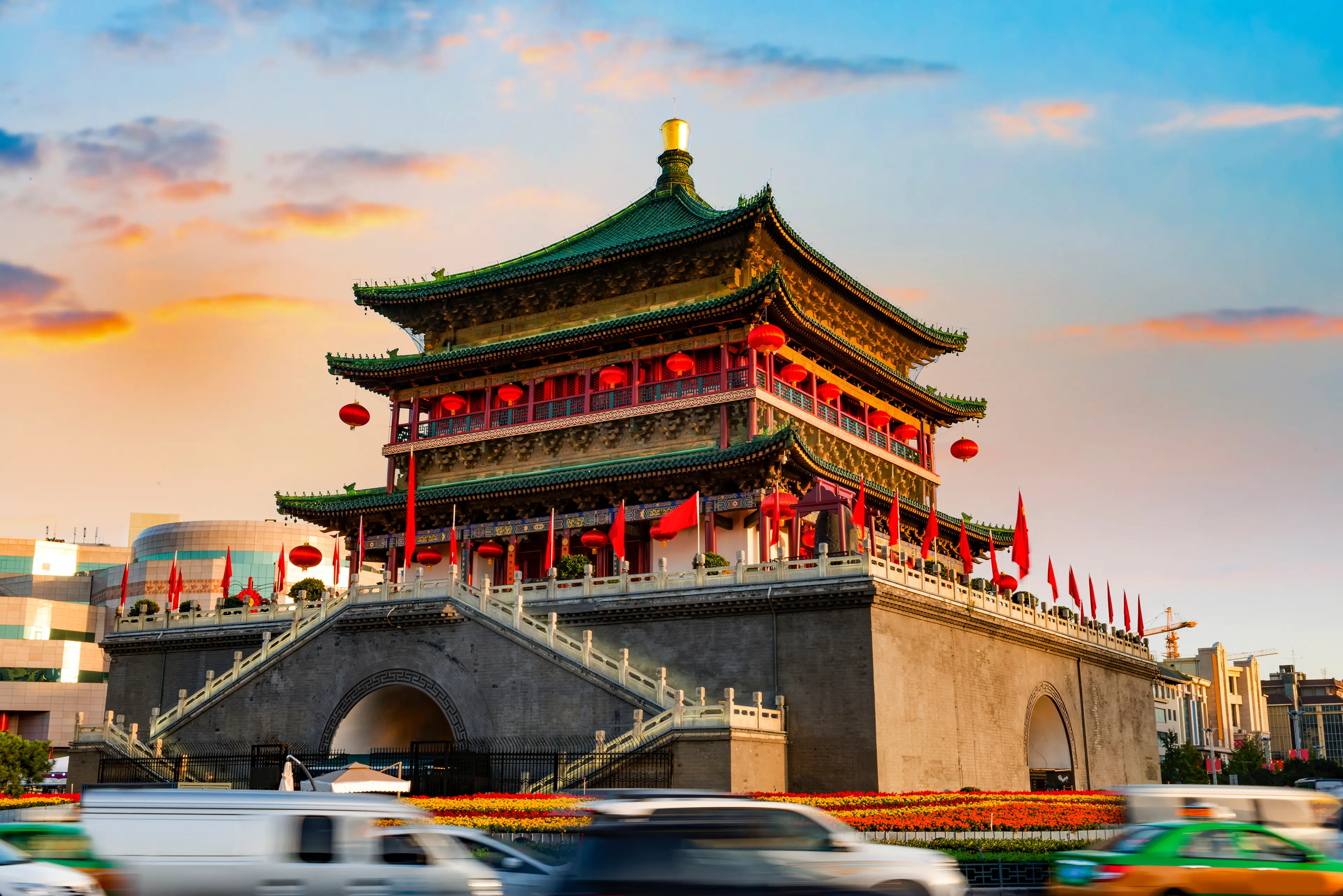Explore Xian, China: A Thrilling 3-Day Itinerary Guide
Xian, China
3 days





About Xian, China
Experience the rich history and vibrant culture of Xian, China, a city that served as the ancient capital for 13 dynasties. Marvel at the world-renowned Terracotta Army, a UNESCO World Heritage site, showcasing thousands of life-sized soldier statues built over 2,000 years ago. Explore the ancient city walls, the largest and best-preserved in China, offering panoramic views of the city. Visit the bustling Muslim Quarter, a hub of local cuisine and traditional markets. Don't miss the Big Wild Goose Pagoda, a symbol of the city's great historical significance. Xian also offers a variety of museums, temples, and natural beauty, including the stunning Mount Huashan. Experience the fusion of ancient and modern China in Xian.
3-Day Itinerary
Day 2
Ancient City Wall and Shaanxi History Museum
Morning
Visit the Ancient City Wall, one of the oldest and best-preserved city walls in China. You can walk or bike along the wall for a unique perspective of the city.
Lunch
Have lunch at a local restaurant. Try some dumplings, a popular dish in Xian.
Afternoon
Visit the Shaanxi History Museum, which houses over 370,000 items, including murals, paintings, pottery, coins, as well as bronze, gold, and silver objects.
Dinner
Enjoy a traditional Chinese hot pot dinner.
Evening
Watch the Tang Dynasty Music and Dance Show, a performance that showcases the music and dance of China's Tang Dynasty.
Day 3
Xian Bell Tower, Drum Tower, and Great Mosque
Morning
Visit the Xian Bell Tower and Drum Tower, iconic landmarks in the city center. The towers were used to keep time and signal the city in ancient times.
Lunch
Have lunch at a local restaurant. Try some Roujiamo, a Chinese-style hamburger.
Afternoon
Visit the Great Mosque of Xian, one of the oldest and largest Islamic mosques in China. It's a beautiful blend of Chinese and Islamic architecture.
Dinner
Have dinner at a local restaurant. Try some Liangpi, a cold noodle dish.
Evening
End your trip with a stroll around the Giant Wild Goose Pagoda's North Square, where you can enjoy a beautiful water and light show.
Attractions in Itinerary (8)

1Terracotta Army
An archaeological site where thousands of life-sized terracotta warriors and horses were discovered, which were buried with China's first emperor, Qin Shi Huang.

2Big Wild Goose Pagoda
A Buddhist pagoda built during the Tang Dynasty, it is one of the most famous Buddhist pagodas in China and a symbol of the city.

3Muslim Quarter
A vibrant area known for its bustling food and market stalls, traditional Muslim cuisine, and unique blend of Chinese and Islamic cultures.

4Ancient City Wall
One of the oldest and best preserved Chinese city walls, constructed in the 14th century during the early Ming Dynasty.

5Shaanxi History Museum
A comprehensive museum with a large collection of artifacts that tell the history of Shaanxi Province.

6Tang Dynasty Music and Dance Show
The Tang Dynasty Music and Dance Show, a wonderful performance of the ancient music and dance, is a must when you visit Xian. The city, which was formerly known as Chang'an has a very long history, and was the imperial capital during 13 dynastic periods.

7Xian Bell Tower and Drum Tower
The Bell Tower and Drum Tower of Xian are two of the city's most iconic landmarks. The Bell Tower, built in 1384 during the early Ming Dynasty, is a symbol of the city. The Drum Tower, located northwest of the Bell Tower, was built in 1380 during the reign of Emperor Hongwu.

8Great Mosque of Xian
The Great Mosque of Xian is one of the oldest, largest and best-preserved Islamic mosques in China. It's a blend of traditional Chinese architecture and Islamic art, and is a popular tourist spot for those interested in religion, culture, and architecture.
Local Food and Drinks (12)

Yangrou Paomo
A mutton soup served with bread. It is a traditional dish in Xian and is considered a must-try for visitors.

Roujiamo
Often referred to as the Chinese hamburger, Roujiamo is a street food staple in Xian. It consists of stewed pork or beef served in a freshly baked bun.

Biang Biang Mian
These are one of the most popular types of noodles in Xian. They are thick, wide, and served with a variety of toppings.

Liángpí
A cold noodle dish that is a popular street food in Xian. It is typically served with cucumber, bean sprouts, and a spicy sauce.

Jing Gao
A steamed rice cake that is a traditional dessert in Xian. It is often filled with sweet red bean paste.

Guantang Baozi
These are soup-filled dumplings that are a specialty in Xian. They are typically filled with mutton or beef and a rich broth.

Shaanxi Sausage
A traditional sausage from the Shaanxi province, where Xian is located. It is typically made with pork and a variety of spices.
Qishan Saozi Mian
A traditional noodle dish from Qishan, a county in the Shaanxi province. It is known for its sour and spicy flavor.

Shaanxi Cold Noodles
A popular summer dish in Xian, these cold noodles are typically served with a spicy and tangy sauce.

Xian Bing
A type of Chinese stuffed pancake. It is a popular street food in Xian and can be filled with a variety of ingredients.
Hanzhong Rice Skin
A traditional dish from Hanzhong, a city in the Shaanxi province. It is made from rice and served with a variety of toppings.
Shaanxi Laozao
A traditional fermented rice wine from the Shaanxi province. It is sweet and often served warm.
Best time to visit
The best time to visit Xian, China is during the spring (March to May) and autumn (September to November) seasons. During these periods, the weather is generally pleasant and comfortable for sightseeing. The summer months (June to August) can be quite hot and crowded, while the winter months (December to February) can be very cold. Spring and autumn also offer beautiful scenery changes, making your visit even more memorable.
How to get around
Xian Metro
Xian has a rapidly expanding metro system that currently consists of 4 lines. It's a convenient and efficient way to travel around the city, with stops at many of the main attractions, including the Bell Tower, Drum Tower, and the Big Wild Goose Pagoda.
City Bus
Xian's bus system is extensive, covering almost every corner of the city. It's a cost-effective way to get around, especially for short distances. Buses are often crowded during peak hours, but they run frequently.
Bicycle
Xian is a bike-friendly city with many dedicated bike lanes and bike-sharing programs. It's a great way to explore the city at your own pace, especially within the city walls where distances are short and the terrain is flat.
Taxi
Taxis are readily available in Xian and can be hailed on the street or booked through a hotel. They're metered and relatively inexpensive, making them a convenient option for getting around, especially if you're traveling in a group or have a lot of luggage.
Ridesharing
Ridesharing services like Didi Chuxing (the Chinese equivalent of Uber) are popular in Xian. They're often cheaper than taxis and can be booked through a smartphone app. Note that you'll need a Chinese phone number and payment method to use these services.
Private Car Hire
For a more comfortable and flexible travel experience, you can hire a private car with a driver. This is a good option if you plan to visit attractions outside the city, like the Terracotta Army.
Foot
Many of Xian's attractions are located within the city walls, making it a walkable city. Walking is a great way to explore the city's historic streets and soak up the local atmosphere.
Public Sightseeing Bus
Xian offers several sightseeing bus routes that stop at major tourist attractions. These buses are a convenient way to see the city's highlights, especially if you're short on time.
Airport Shuttle
Xian Xianyang International Airport is located about 40km from the city center. There are regular shuttle buses that connect the airport with several locations in the city, including the Xian Railway Station and the Big Wild Goose Pagoda.
Important information
Currency RMB
Time zoneUTC+8
Driving sideRight
Emergency phoneAmbulance: 120; Fire: 119; Police: 110, 122 (traffic accident)
Drinking waterOpt for bottled water
Power sockets
Voltage220 V
Things to know about Xian, China as a first time visitor
1
Xian is a city with a rich history, being one of the Four Great Ancient Capitals of China. It served as the capital for 13 dynasties over 1,100 years.
2
The local language is Mandarin, but English is not widely spoken. It's recommended to learn a few basic phrases or have a translation app handy.
3
The currency used in Xian is the Chinese Yuan (CNY). Credit cards are accepted in many places, but it's always good to have some cash on hand.
4
Xian has a continental monsoon climate, with hot, humid summers and cold, dry winters. Average summer temperatures range from 77-91°F (25-33°C) and winter temperatures can drop to 28-44°F (-2-7°C).
5
Xian is known for its delicious street food. Be sure to try local specialties like Biang Biang noodles, Roujiamo (Chinese hamburger), and Yangrou Paomo (mutton soup with bread).
6
Tipping is not customary in China, and in some places, it may even be considered rude.
7
Public transportation is very efficient in Xian. The city has an extensive bus network and a metro system. Taxis and ride-hailing apps like Didi are also available.
8
Internet censorship is prevalent in China. Popular western websites and social media platforms like Google, Facebook, and Twitter are blocked. Consider getting a VPN before your trip.
9
Xian is in the China Standard Time zone, which is 8 hours ahead of Greenwich Mean Time (GMT+8).
10
Tap water in Xian is not safe to drink. Always drink bottled water and avoid ice in your drinks.
11
Xian is generally safe for tourists, but like any major city, it's wise to be aware of your surroundings and keep an eye on your belongings.
12
Public restrooms in Xian often do not provide toilet paper, so it's a good idea to carry some with you.
13
The voltage in China is 220V, 50Hz AC. The plug types are Type A, C, and I. You may need a power adapter.
14
Xian has strict smoking regulations. Smoking is banned in all indoor public places, workplaces, and on public transportation.
15
Healthcare facilities in Xian are adequate, but it's recommended to have travel insurance that covers medical evacuation.
16
Xian is a very pedestrian-friendly city with many pedestrian-only streets and zones. However, traffic can be chaotic, so always be cautious when crossing the road.
17
It's considered impolite to touch someone's head in China. Also, avoid pointing directly with your finger, instead use your whole hand.
18
The Chinese government requires all foreigners to register their place of residence within 24 hours of arrival. If you're staying at a hotel, they will usually do this for you.
19
Xian has a high population density, so be prepared for crowds, especially during peak travel seasons.
20
If you're planning to shop, remember that bargaining is common in local markets. However, it's not accepted in malls or larger stores.
Basic Mandarin Chinese to know as a first time visitor
English phrase | Native phrase | Pronunciation | When to use it |
|---|---|---|---|
Hello | 你好 | Ni hao | Greeting someone |
Goodbye | 再见 | Zai jian | Leaving or saying goodbye |
Thank you | 谢谢 | Xie xie | Showing appreciation |
Please | 请 | Qing | Making a request |
Yes | 是 | Shi | Agreeing or confirming |
No | 不是 | Bu shi | Disagreeing or denying |
Excuse me | 对不起 | Dui bu qi | Getting attention or apologizing |
I don't understand | 我不懂 | Wo bu dong | When you don't understand what was said |
Do you speak English? | 你会说英语吗? | Ni hui shuo Yingyu ma? | Trying to find someone who speaks English |
Where is the bathroom? | 洗手间在哪里? | Xi shou jian zai na li? | Looking for a bathroom |
I'm lost | 我迷路了 | Wo mi lu le | When you are lost |
Help | 帮助 | Bang zhu | In case of emergency |
Call the police | 报警 | Bao jing | In case of emergency |
How much does this cost? | 这个多少钱? | Zhe ge duo shao qian? | When shopping |
I would like to order | 我想点菜 | Wo xiang dian cai | At a restaurant |
Water | 水 | Shui | When you want water |
Beer | 啤酒 | Pi jiu | Ordering a beer |
Tea | 茶 | Cha | Ordering tea |
Coffee | 咖啡 | Ka fei | Ordering coffee |
Cheers | 干杯 | Gan bei | Making a toast |
Packing List
Clothing
Lightweight clothing
Underwear
Socks
Comfortable walking shoes
Swimwear (if your hotel has a pool)
Light jacket or sweater for cooler evenings
Rain jacket or umbrella
Sunglasses
Hat for sun protection
Toiletries
Travel-sized shampoo and conditioner
Body wash or soap
Toothbrush and toothpaste
Deodorant
Razor and shaving cream
Makeup and makeup remover
Sunscreen
Hand sanitizer
First-aid kit (band-aids, antiseptic wipes, tweezers)
Prescription medications
Insect repellent
Travel documents and essentials
Passport and visa
Driver's license or other ID
Airline tickets or e-ticket confirmation
Hotel reservation confirmation
Travel insurance documents
Emergency contacts and addresses for your stay
Credit cards and cash
Guidebook or map
Electronics and gadgets
Smartphone
Charger for smartphone
International power adapter
Camera
Charger for camera
Headphones
Portable power bank
Miscellaneous items
Snacks for travel
Travel pillow and blanket
Earplugs and eye mask
Reusable water bottle
Books or e-books for travel
Travel-sized laundry detergent
Zip-lock bags for organization
Tissues or wet wipes
Weather Conditions
When visiting Xian, China, it's important to understand that the city experiences a temperate monsoon climate, with four distinct seasons. Spring (March to May) is generally mild, but it can still be chilly in the early part of the season, with temperatures ranging from 40°F to 70°F (4°C to 21°C). It's a good idea to pack layers to accommodate the fluctuating temperatures. Summer (June to August) in Xian can be hot and humid, with temperatures often reaching up to 90°F (32°C). It's also the rainy season, so don't forget to pack an umbrella or raincoat. Autumn (September to November) is arguably the best time to visit Xian. The weather is comfortable, with temperatures ranging from 50°F to 70°F (10°C to 21°C), and the city is beautifully adorned with autumn foliage. Winter (December to February) can be quite cold, with temperatures dropping as low as 20°F (-6°C). Snow is not uncommon during this time, so be sure to pack warm clothing and sturdy shoes. Regardless of when you visit, it's always a good idea to check the forecast before your trip to ensure you're packing appropriately. Also, remember that air quality can vary, so consider bringing a mask if you're sensitive to pollution. Lastly, keep in mind that Xian is a city rich in history and culture. Regardless of the weather, there are always plenty of indoor attractions to explore, such as the Terracotta Army Museum, the Shaanxi History Museum, and the Xian City Wall.
| Month | Hi / Lo (°C) | Weather Overview |
|---|---|---|
January | 6° / -4° | January is the coldest month in Xian, with temperatures often dropping below freezing. It's a quiet time for tourism, so you'll have the city's attractions to yourself. |
February | 9° / -1° | February sees a slight increase in temperature but it's still quite chilly. The Chinese New Year celebrations can make this a vibrant time to visit. |
March | 15° / 3° | March marks the beginning of spring in Xian, with temperatures starting to warm up. The city's parks and gardens begin to bloom, making it a beautiful time to visit. |
April | 21° / 9° | April is a pleasant month to visit Xian, with mild temperatures and plenty of sunshine. The city's cherry blossoms are in full bloom, adding to the city's charm. |
May | 26° / 14° | May is a warm and comfortable month in Xian, perfect for outdoor activities. The city's ancient walls and terracotta warriors are a must-see. |
June | 31° / 19° | June is the start of summer in Xian, with temperatures rising significantly. It's a great time to visit the city's outdoor attractions, but be prepared for occasional rain showers. |
July | 34° / 22° | July is the hottest month in Xian, with temperatures often exceeding 30 degrees Celsius. It's a great time to visit if you don't mind the heat, but be prepared for occasional thunderstorms. |
August | 33° / 21° | August is still quite hot in Xian, but temperatures start to decrease slightly. It's a great time to visit the city's historical sites, but be prepared for occasional rain showers. |
September | 28° / 16° | September marks the beginning of autumn in Xian, with temperatures starting to cool down. The city's parks and gardens are particularly beautiful during this time. |
October | 22° / 10° | October is a comfortable month to visit Xian, with mild temperatures and plenty of sunshine. The city's ancient walls and terracotta warriors are a must-see. |
November | 15° / 3° | November sees a significant drop in temperature, with the onset of winter. It's a quiet time for tourism, so you'll have the city's attractions to yourself. |
December | 8° / -2° | December is a cold month in Xian, with temperatures often dropping below freezing. It's a quiet time for tourism, but the city's Christmas celebrations can make it a vibrant time to visit. |
Did you know?
Places near by Xian, China

Huashan Mountain
One of China's five great mountains, known for its steep and narrow paths.

Terracotta Army
A collection of terracotta sculptures depicting the armies of Qin Shi Huang, the first Emperor of China.

Hanyangling Mausoleum
The joint tomb of the Western Han Dynasty Emperor Liu Qi and his Empress, Wang.

Famen Temple
A Buddhist temple that holds the finger bone of the Sakyamuni Buddha.

Qianling Mausoleum
The tomb of the Tang dynasty Emperor Gaozong and his wife, Empress Wu Zetian.

Mount Li
A notable mountain in China, known for its hot springs and the location of the tomb of the First Qin Emperor.